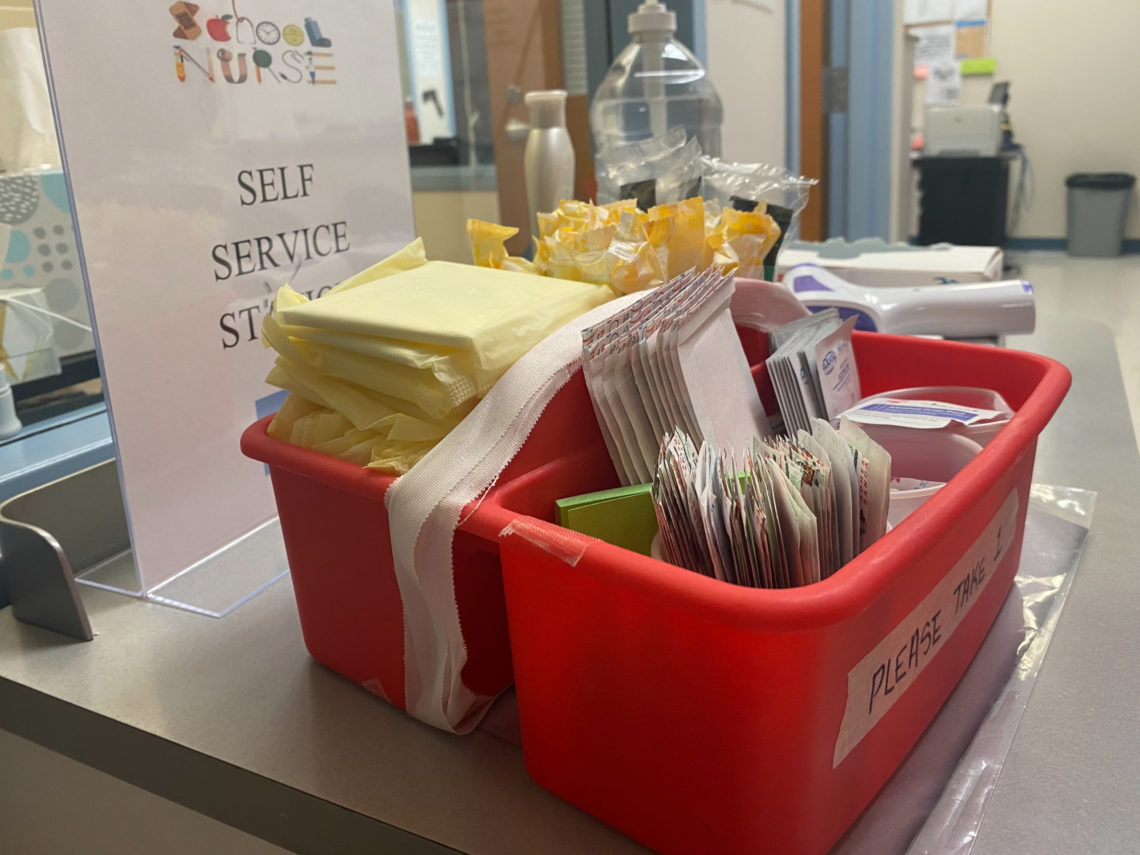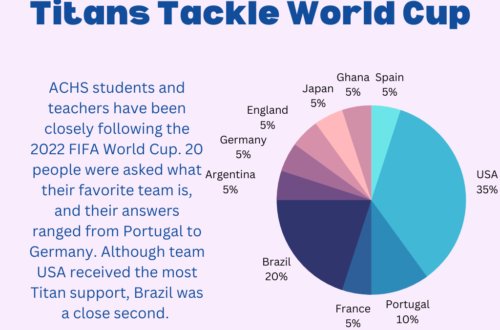Chloe Yokitis
Editor
In compliance with a 2022 Virginia policy, ACHS administration installed free menstrual product dispensers in women’s bathrooms at King Street Campus before the start of the school year. However, the dispensers were never filled, and they remain empty.
Helen Morris, President of the Alexandria Campaign on Adolescent Pregnancy, said that— in theory— the dispensers’ installation is a step in the right direction.
“It’s a great equity win, as a school supporting young people,” said Morris, who is a former ACPS School Board Member. “[Especially since students can now] afford not to go to the nurse and have confidence that they’ll be supported.”
Ruth Christino, a junior, agreed that menstrual product dispensers, if filled, would benefit students, especially considering recent federal changes in reproductive health regulation.
“With Roe v. Wade being overturned and everything, I think menstrual rights and reproductive rights and health are very important,” said Christino. “I noticed [the dispensers in women’s bathrooms] immediately, and I was honestly very excited about it.”
Her excitement quickly wore off when she realized that the dispensers, which have slots for both pads and tampons, were empty.
“I love the idea,” Christino said. “But ACPS is not good about maintaining their bathrooms, so why should I have faith that there’s always gonna be a period product there, or the one that I want to use?” she said. “I kind of doubt that they will maintain it. But I hope they will.”
Zayda Morales, the Health Educator at the Teen Wellness Center (located on the first floor of King Street Campus), sought answers from the ACPS maintenance team after discovering that the dispensers were installed but empty.
“I asked [an employee about] who is in charge of refilling and filling those things, and he said the school contracts a cleaning company and that cleaning company is responsible for refilling the boxes,” said Morales. “I’d assumed that they’d put stuff in [after I talked to them], and maybe they did and it’s gone, I don’t know. But that’s the story.”
The dispensers, according to ACPS Director of School Health Services Dr. Robin Wallin, have never been filled. ACPS is in the process of acquiring menstrual products for the dispensers to comply with the state policy— which, Dr. Wallin said, is an “unfunded mandate.”
“[The policy] mandates that school divisions make menstrual supplies available at all grade levels,” said Dr. Wallin. Though the policy is vague about elementary schools— only saying that free products “need to be available”— the policy is more specific when it comes to secondary schools.
“In middle and high schools, the law says that menstrual products need to be available in the restrooms,” said Dr. Wallin. “And I know ACPS has been kind of scrambling to make that happen.”
ACPS is in the process of ordering and waiting to receive the products, she said.
“Hopefully, sometime this semester, you’ll be able to see that at the high school. But in the meantime, there are other locations where [people] can get products at school,” said Dr. Wallin.
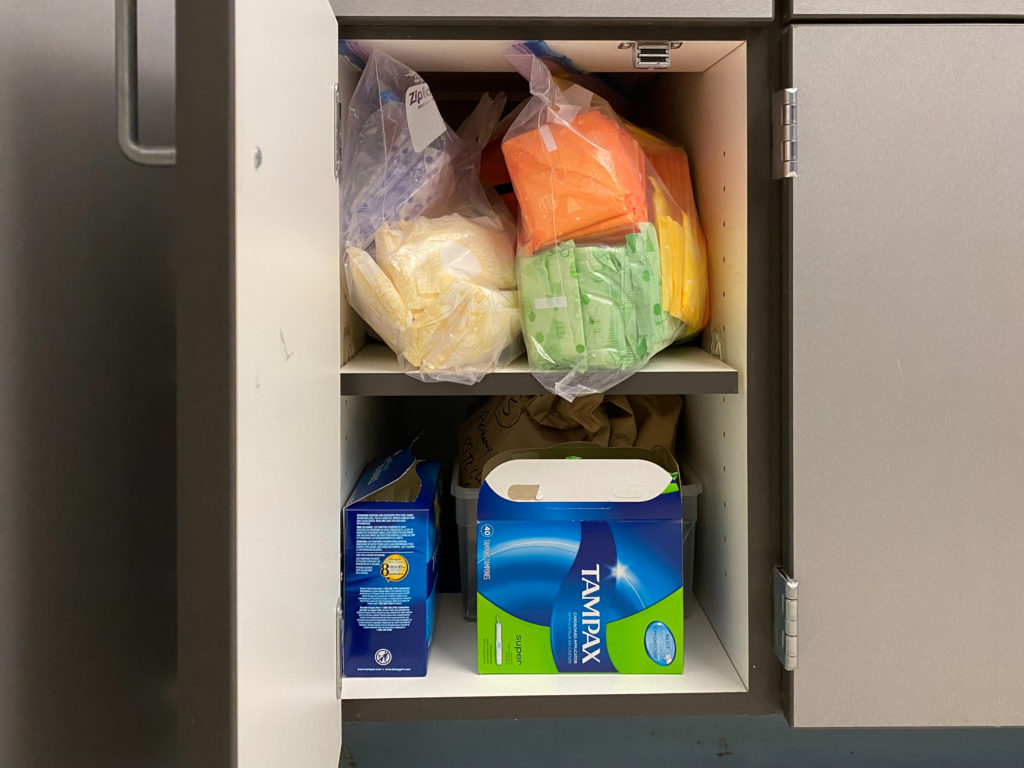
Each Academy office at King Street Campus supplies a variety of menstrual products. To use these products, students can ask any Academy’s administrative assistant.
Even if products are not available in the King Street Campus’ bathrooms— or not accessible, since the law doesn’t regulate men’s or gender neutral bathrooms— all ACPS schools have products in other locations, including Academy offices, counselors’ offices, and nurses’ clinics.
“Menstrual supplies are stored in the Health Clinic here at Brooks,” said Nurse Wendy Harper, who works at Naomi L. Brooks Elementary School. “School clinics have always had hygiene supplies, so this is not a change [brought on by the state policy].”
At the King Street Campus, products are available in the nurse’s clinic as well, said Nurse Kim Phillips. At the clinic, which is located on the first door to the right in the College and Career Wing, there is a “self-care” center with free health products like bandaids and menstrual products.
“We always have the supplies here. No shame. We just want people to be safe. We want people to understand about their bodies and stay in school. This is just part of it,” Phillips said. “Come and get a pad or a tampon, and get back to class.”
Phillips also encourages students to take pads for the rest of the day.
“If it’s the first thing in the morning, or whenever, they can take more pads if they need to take them home. And they’re welcome to come back the next day, whenever they need. We ask that people not abuse the system, but no shame, no questioning. Get what you need,” she said.
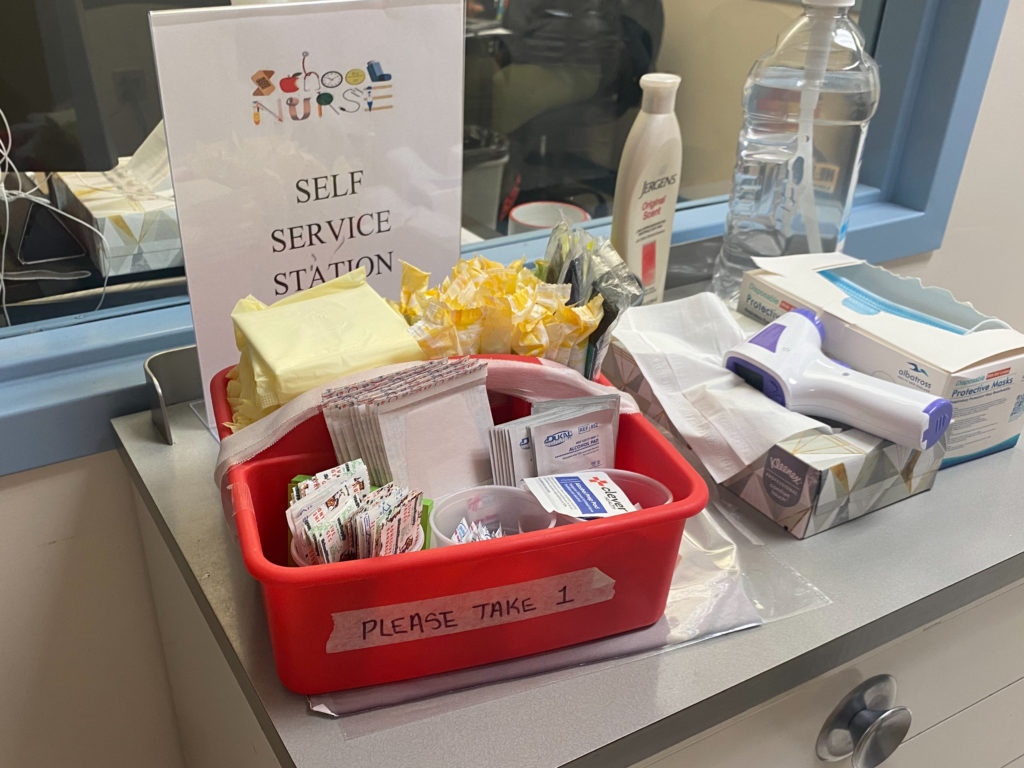
The self-care service area is right next to the door of the clinic. Though menstrual cycles are often a hushed matter, said Phillips, the clinic aims to emphasize the normality of periods. “We normalize it— it’s right there, we’re not hiding it,” she said.
While the bathroom dispensers have not been filled at King Street Campus yet, Satellite Campus Administrative Assistant Sheree Stephens said that filled menstrual product dispensers are available and filled in women’s bathrooms at that building.
“We have dispensers here at Satellite in the women’s restrooms that get restocked by our wonderful school nurse,” said Stephens. “She does a wonderful job at making sure that it is well-stocked.”
Minnie Howard Campus Administrator Alexander Duncan said that there are filled dispensers in Minnie Howard’s women’s bathrooms as well. However, he said the misuse of menstrual products is a concern.
“We stock dispensaries, but users come along and empty them,” said Duncan, “either to vandalize with the products or to store them away for personal use.”
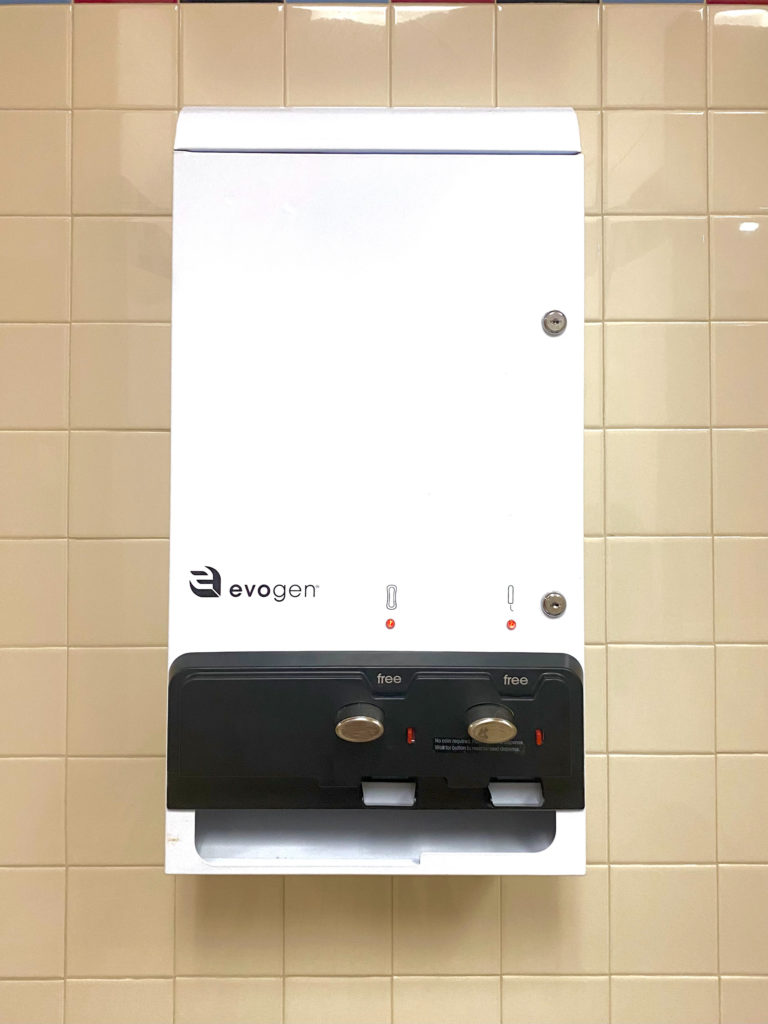
Lenhle Vilakati, a senior, said that she appreciates the menstrual product dispensaries in King Street Campus bathrooms but doesn’t understand their purpose unless they’re filled. “I like that it’s free, but it’s empty— so how effective is it?” she said.
Some students believe that ACPS should be doing more to support menstruating students across all campuses.
Senior Lenhle Vilakati recounted how she once ran out of tampons during the school day, so she went to the nurse’s office to get some but was only given one.
“I asked the nurse, ‘Can I have another one?’ And she said, ‘You can come back.’ I looked at her [like she was] crazy. I just don’t think one tampon is enough,” Vilakati said.
Vilakati also believes that ACHS should provide a wider variety of products.
“I think ACPS can invest in their students who have menstrual cycles. Get more menstrual products in a variety of sizes,” she said. “Not everyone’s period is gonna be small or anything like that. Naturally, it’s different for everyone.”
Bronwyn Turney, a junior, said that accessible, available menstrual products would make students feel seen.
“[Periods are] a really hard and awkward thing, so [menstrual product access, especially in the bathrooms] just makes it a little bit easier. And I think that students at this school deserve it,” said Turney.
Vilakati said she thinks the root of the struggle for menstrual product access comes from the stigma and sexism associated with menstruation.
“If it was [cisgender] guys going through this, they would never have to worry,” Vilakati said. “Why should we?”
All photos by Chloe Yokitis for Theogony

